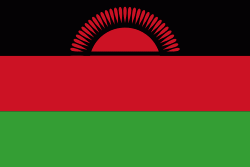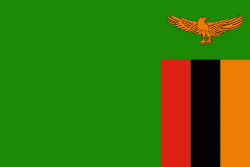Chichewa language
Chewa (also known as Nyanja, ) is a Bantu language spoken in Malawi and a recognised minority in Zambia and Mozambique. The noun class prefix chi- is used for languages, so the language is usually called Chichewa and Chinyanja (spelled Cinianja in Portuguese). In Malawi, the name was officially changed from Chinyanja to Chichewa in 1968 at the insistence of President Hastings Kamuzu Banda (himself of the Chewa people), and this is still the name most commonly used in Malawi today. In Zambia, the language is generally known as Nyanja or Cinyanja/Chinyanja '(language) of the lake' (referring to Lake Malawi).
Chewa belongs to the same language group (Guthrie Zone N) as Tumbuka, Sena and Nsenga.
Throughout the history of Malawi, only Chewa and Tumbuka have at one time been the primary dominant national languages used by government officials and in school curriculums. However, the Tumbuka language suffered a lot during the rule of President Hastings Kamuzu Banda, since in 1968 as a result of his one-nation, one-language policy it lost its status as an official language in Malawi. As a result, Tumbuka was removed from the school curriculum, the national radio, and the print media. With the advent of multi-party democracy in 1994, Tumbuka programmes were started again on the radio, but the number of books and other publications in Tumbuka remains low.
Chewa is the most widely known language of Malawi, spoken mostly in the Central and Southern Regions of that country. It is also spoken in Eastern Province of Zambia, as well as in Mozambique, especially in the provinces of Tete and Niassa. It was one of the 55 languages featured on the Voyager spacecraft.
Chewa belongs to the same language group (Guthrie Zone N) as Tumbuka, Sena and Nsenga.
Throughout the history of Malawi, only Chewa and Tumbuka have at one time been the primary dominant national languages used by government officials and in school curriculums. However, the Tumbuka language suffered a lot during the rule of President Hastings Kamuzu Banda, since in 1968 as a result of his one-nation, one-language policy it lost its status as an official language in Malawi. As a result, Tumbuka was removed from the school curriculum, the national radio, and the print media. With the advent of multi-party democracy in 1994, Tumbuka programmes were started again on the radio, but the number of books and other publications in Tumbuka remains low.
Chewa is the most widely known language of Malawi, spoken mostly in the Central and Southern Regions of that country. It is also spoken in Eastern Province of Zambia, as well as in Mozambique, especially in the provinces of Tete and Niassa. It was one of the 55 languages featured on the Voyager spacecraft.
Country
-
Malawi
Malawi, officially the Republic of Malawi, is a landlocked country in southeastern Africa. It is bordered by Zambia to the west, Tanzania to the north and northeast, and Mozambique to the east, south and southwest. Malawi spans over 118484 km² and has an estimated population of 19,431,566 (as of January 2021). Malawi's capital (and largest city) is Lilongwe. Its second-largest is Blantyre, its third-largest is Mzuzu and its fourth-largest is its former capital, Zomba. The name Malawi comes from the Maravi, a name for the Chewa people who inhabit the area. The country is nicknamed "The Warm Heart of Africa" because of the friendliness of its people.
In 1891, the area was colonised by the British and became a protectorate of the United Kingdom known as Nyasaland. In 1953, it became a protectorate within the semi-independent Federation of Rhodesia and Nyasaland. The Federation was dissolved in 1963. In 1964, the protectorate was ended: Nyasaland became an independent country under Queen Elizabeth II, and was renamed Malawi. Two years later it became a republic. It gained full independence from the United Kingdom, and by 1970 had become a totalitarian one-party state under the presidency of Hastings Banda, who remained in this role until 1994. Malawi has a democratic, multi-party republic headed by an elected president. Lazarus Chakwera of the Malawi Congress Party led the Tonse Alliance grouping of nine political parties and won the court-mandated Presidential Election rerun held on 23 June 2020 after the May 2019 Presidential Election was annulled due to electoral irregularities. The country's military, the Malawian Defence Force, includes an army, a navy, and an air wing. Malawi's foreign policy is pro-Western. It maintains positive diplomatic relations with most countries, and participates in several international organisations, including the United Nations, the Commonwealth of Nations, the Southern African Development Community (SADC), the Common Market for Eastern and Southern Africa (COMESA), and the African Union (AU). -
Zambia
Zambia, officially the Republic of Zambia, is a landlocked country at the crossroads of Central, Southern and East Africa, and is typically referred to as being in Southern Africa at its most central point. Its neighbours are the Democratic Republic of the Congo to the north, Tanzania to the northeast, Malawi to the east, Mozambique to the southeast, Zimbabwe and Botswana to the south, Namibia to the southwest, and Angola to the west. The capital city is Lusaka, located in the south-central part. The population of around 20.1 million (2023) is concentrated mainly around Lusaka in the south and the Copperbelt Province to the north, the core economic hubs of the country.
The region was affected by the Bantu expansion of the 13th century. Following the arrival of European explorers in the 18th century, the British colonised the region into the British protectorates of Barotseland-North-Western Rhodesia and North-Eastern Rhodesia comprising 73 tribes, towards the end of the 19th century. These were merged in 1911 to form Northern Rhodesia. For most of the colonial period, Zambia was governed by an administration appointed from London with the advice of the British South Africa Company. On 24 October 1964, Zambia became independent of the United Kingdom and prime minister Kenneth Kaunda became the inaugural president. From 1972 to 1991 Zambia was a one-party state with the United National Independence Party as the sole legal political party under the motto "One Zambia, One Nation" coined by Kaunda. Kaunda was succeeded by Frederick Chiluba of the social-democratic Movement for Multi-Party Democracy in 1991, beginning a period of government decentralisation.
